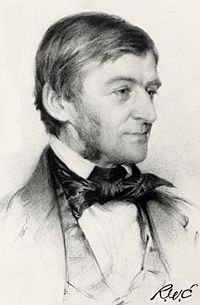
It's funny that his lectures and essays are more poetic than his poems. It's as if he had a formal standard to write to in poetry that didn't at all suit his mentality. He seems stiff and self-conscious in the poems, relaxed and exuberantly expressive in the essays. Too bad free verse didn't come along earlier so he could take advantage of its expressive vehicle.
"Commodity" is the essay I'm on now, and I find it surprising that in a few paragraphs he can encompass the sweep and point of human history. I never thought of Emerson as ecstatic, but this passage from the essay leaped out at me in that tone:
The misery of man appears like childish petulance,
when we explore the steady and prodigal provision
that has been made for his support and delight
on this green ball which floats him through the heavens.
What angels invented these splendid ornaments,
these rich conveniences, this ocean of air above,
this ocean of water beneath,
this firmament of earth between?
this zodiac of lights, this tent of dropping clouds,
this striped coat of climates, this fourfold year?
The line-breaks, of course, are mine. But isn't this a better poem than the formal one he wrote on a similar subject:
Lo! I uncover the land
Which I hid of old time in the West
As the sculptor uncovers the statue
When he has wrought his best;
I show Columbia, of the rocks
Which dip their foot in the seas
And soar to the air-borne flocks
Of clouds and the boreal fleece.
I will divide my goods;
Call in the wretch and slave:
None shall rule but the humble,
And none but Toil shall have.
I will have never a noble,
No lineage counted great;
Fishers and choppers and ploughmen
Shall consititute a state.
Go, cut down trees in the forest
And trim the straightest boughs;
Cut down trees in the forest
And build me a wooden house.
Call the people together,
The young men and the sires,
The digger in the harvest-field,
Hireling and him that hires;
And here in a pine state-house
They shall choose men to rule
In every needful faculty,
In church and state and school.
The verse, over-tidy and preachy (it was given as a sermon), lacks the soar and scope of the essay. Interesting that the poetry Emerson looked to -- including translations of Sufi poets Hafiz, Rumi and Saadi -- was of a past age, while his prose looks entirely and surprisingly forward. Because he wasn't bound by poetic convention in the prose, it breathes.
